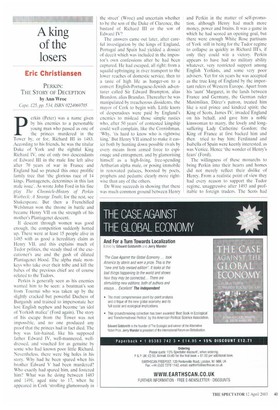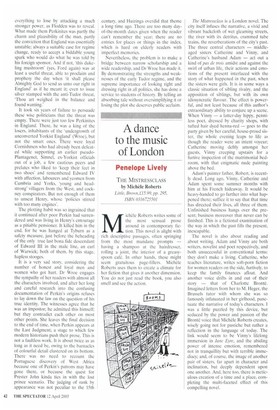A king of the losers
Eric Christiansen
PER KIN: THE STORY OF DECEPTION by Ann Wroe Cape, £25. pp. 534, ISBN 0224069705 perkin (Peter) was a name given by his enemies to a personable young man who passed as one of the princes murdered in the Tower by, or for, Richard III in 1483. According to his friends, he was the titular Duke of York and the rightful King Richard IV, one of only two descendants of Edward III in the male line left alive after 70 years of war in France and England had so pruned this once prolific family tree that 'the glorious race of 14 kings, Plantagenets, determines in this last male issue'. As wrote John Ford in his fine play The Chronicle-History of Perkin Warbeck: A Strange Truth; for the rest, see Shakespeare. But then a Frenchified Welshman won the throne in battle and became Henry VII on the strength of his mother's Plantagenet descent.
If descent through women was good enough, the competition suddenly hotted up. There were at least 15 people alive in 1485 with as good a hereditary claim as Henry VII, and this explains much of Tudor politics, the steady thud of the executioner's axe and the gush of diluted Plantagenet blood. The alpha male monkeys who take over their tribe and kill the babes of the previous chief are of course related to the Tudors.
Perkin is generally seen as his enemies wanted him to be seen: a boatman's son from Tournai who was taken up by the slightly cracked but powerful Duchess of Burgundy and trained to impersonate her lost English nephew and become 'an idol of Yorkish malice' (Ford again). The story of his escape from the Tower was not impossible, and no one produced any proof that the princes had in fact died. The boy was fair-haired, like his supposed father Edward IV, well-mannered, welldressed, and vouched for as genuine by some who had known poor little Richard. Nevertheless, there were big holes in his story. Why had he been spared when his brother Edward V had been murdered? Who exactly had spared him, and fostered him? What was he doing between 1483 and 1491, aged nine to 17, when he appeared in Cork 'strolling glamorously in the street' (Wroe) and uncertain whether to he the son of the Duke of Clarence, the bastard of Richard III or the son of Edward IV?
The answers came out later, after careful investigation by the kings of England, Portugal and Spain had yielded a dossier of deceit which was included in the impostor's own confessions after he had been captured. He had escaped, all right: from a squalid upbringing in river transport to the lower reaches of domestic service, then to a taste of high life as hanger-on to a convert English-Portuguese-Jewish adventurer called Sir Edward Brampton, alias Brandon, alias Bran dao. Thereafter he was manipulated by treacherous dissidents, the mayor of Cork to begin with. Little knots of desperadoes were paid by England's enemies to mislead those simple rustics who, after 50 years' of contested kingship could well complain, like the Cornishman, 'Why, 'tis hard to know who is righmise kinC But Henry VII aimed to make it easier both by hunting down possible rivals by every means from armed force to espionage and entrapment, and by glamorising himself as a high-living, free-spending Arthurian alpha male, or posing immobile in renovated palaces, boosted by poets, prophets and pedants: clearly more rightwise than any of the others.
Dr Wroe succeeds in showing that there was much common ground between Henry and Perkin in the matter of self-promotion, although Henry had much more money, power and brains. It was a game in which he had scored an opening goal, but there were enough White Rose partisans of York still in being for the Tudor regime to collapse as quickly as Richard III's, if only they could win a victory. Perkin appears to have had no military ability whatever, very restricted support among English Yorkists, and some very poor advisers. Yet for six years he was accepted as the true king of England by the important rulers of Western Europe. Apart from his 'aunt' Margaret, in the lands between France and Germany, the German ruler Maximilian, Durer's patron, treated him like a real prince and kindred spirit; the King of Scots, James IV, invaded England on his behalf, and gave him a noble kinswoman to marry, the lovely and longsuffering Lady Catherine Gordon; the King of France at first backed him and then tried to buy him; Ferdinand and Isabella of Spain were keenly interested, as was Venice. Hence 'the wonder of Henry's fears' (Ford).
The willingness of these monarchs to bring Perkin into their hearts and homes did not merely reflect their dislike of Henry. From a realistic point of view they had every reason to support the Tudor regime, unaggressive after 1493 and profitable to foreign traders, The Scots had everything to lose by attacking a much stronger power, as Flodden was to reveal. What made them Perkinites was partly the charm and plausibility of the man, partly the conviction that England was essentially unstable; always a suitable case for regime change, ready to accept a biddable young spark who would do what he was told by his foreign sponsor. And if not, 'this dukeling mushroom' (yes, Ford again) was at least a useful threat, able to proclaim and prophesy the day when 'it shall please Almighty God to send us unto our right in England' as if he meant it; even to issue silver stamped with the anti-Tudor threat, 'Thou art weighed in the balance and found wanting.'
It took six years of failure to persuade these wise politicians that the threat was empty. There were just too few Perkinites in England. There, he was a king of the losers, inhabitants of the 'undergrowth of unconverted Yorkist England' (Wroe), but not the smart ones. There were loyal Cornishmen who had already been defeated while supporting an earlier pseudoPlantagenet. Simnel, ex-Yorkist officials out of a job, a few cautious peers and prelates who liked to 'keep their feet in two shoes' and remembered Edward IV with affection, labourers and yeomen from Cumbria and Yorks, 'young and headstrong' villagers from the West, and cockney conspirators. But not enough of them to unseat Henry, whose 'policies stirred with too many engines'.
The plotting habit was so ingrained that it continued after poor Perkin had surrendered and was living in Henry's entourage as a pitiable pensioner. It killed him in the end, for he was hanged at Tyburn as a safety measure, just before the beheading of the only true last bona fide descendant of Edward III in the male line, an earl of Warwick; both of them, by this stage, hapless stooges.
It is a very sad story, considering the number of honest and loyal men and women who got hurt. Dr Wroe engages the sympathy of her readers with almost all the characters involved, and after her long and careful research into the confusing documentation of Perkins origins refuses to lay down the law on the question of his true identity. The witnesses agree that he was an impostor; he admitted this himself; but they contradict each other on most other points. She leaves the final decision to the end of time, when Perkin appears at the Last Judgment; a stage to which few modern historians push their prose. This is not a faultless work. It is about twice as as long as it need be, owing to the barnacles of colourful detail clustered on its bottom. There was no need to recount the Portuguese discovery of West Africa because one of Perkin's patrons may have gone there, or because the quest for Prester John kinda ties in with the lost prince scenario. The judging of rank by appearance was not peculiar to the 15th
century, and Huizinga overdid that theme a long time ago. There are too many dayof-the-month dates given when the reader can't remember the year; there are no entries for places or things in the index, which is hard on elderly readers with imperfect memories.
Nevertheless, the problem is to make a bridge between narrow scholarship and a wide readership, and Dr Wroe has made it. By demonstrating the strengths and weaknesses of the early Tudor regime, and the supreme importance of looking right and dressing right in all politics, she has done a service to students of history. By telling an absorbing tale without oversimplifying it or losing the plot she deserves public acclaim.



































































 Previous page
Previous page